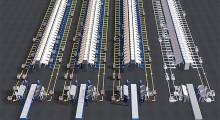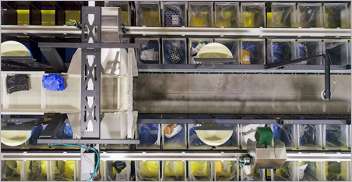Resgreen Group International, or RGGI, today announced that its pre-production LilBuddy mobile robot is beginning the validation and floor testing process with its full suite of RGGI products.
These products, all Industry 4.0-compliant, include PullBuddy, BotWay, and RGGI’s safety suite, including wireless stack lights, wireless push buttons, and smart load-handling frames (LHFs). LilBuddy is designed for loads up to 100 kg (220 lb.) and is based on the Robot Operating System (ROS).
As a “hybrid” system, LilBuddy is able to travel long distances using natural guidance like an autonomous mobile robot (AMR), the company said. For precision docking, the vehicle relies on QR codes/fiducials or magnetic tape, like an automated guided vehicle (AGV).
This dual capability give LilBuddy greater versatility within its working environment, claimed Resgreen Group.
What’s inside LilBuddy
LilBuddy features front and rear solid-state 2D/3D lidars that are used to map the areas traveled in and detect obstacles in its path. Once LilBuddy learns the map, it can be dispatched to any location with triggers and commands from BotWay and BotWay connected devices.
Routes, a series of waypoints and commands, can also be set up with a companion app or BotWay to specify exact movements and commands in long-distance travel or complex chains of events.
LilBuddy is controlled by distinct command sets for motion, security, and load engagement. In RGGI’s validation test, LilBuddy will be given virtual waypoints and commands via triggers from wireless buttons, two smart LHFs and a PullBuddy AGV, all coordinated by BotWay in an interoperable mode with collaborative robots.
RGGI said its engineers have years of experience in the material handling and robotics industries. It also provides consulting services including backend operational oversight, material handling assessment, workflow analysis, and steady-state yield management using artificial intelligence and management systems.
Article topics
Email Sign Up
















